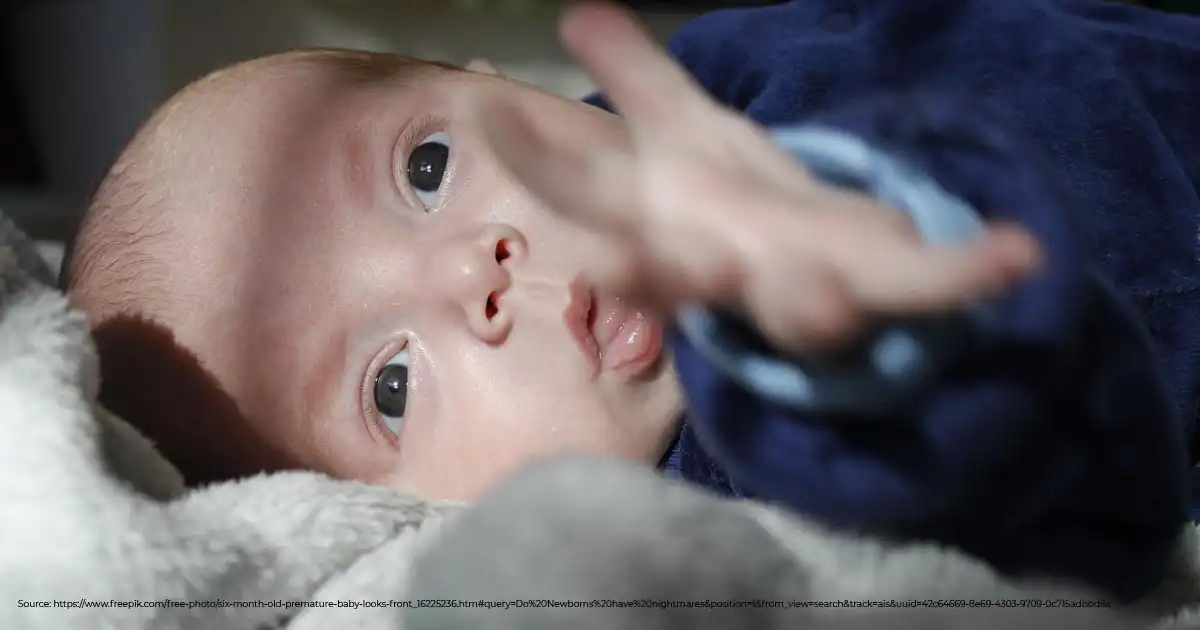Do Newborns Have Nightmares? Secrets & Tips Unveiled

“Is my baby having a nightmare?” This is a question that many parents may wonder about, especially when they see their babies twitching, frowning, or crying in their sleep.
What are they dreaming about? Are they scared or in pain?
How can we comfort them and ensure they have a good night’s rest?
Nightmares are unpleasant or frightening dreams that can cause emotional distress and disrupt sleep. They are common in children and adults, but what about newborns?
Do they even dream at all? And if they do, can they have nightmares too?
In this blog, we will explore the fascinating world of newborns’ dreams, nightmares, its causes, treatments and smart tips for your baby’s uninterrupted sleep.
We hope you enjoy reading this blog and find it helpful and informative. Let’s begin!
What Causes Nightmares?
Nightmares are caused by a variety of factors, some of which are psychological, some of which are physiological, and some of which are environmental. Now, to answer this question with more clarity we need to first answer the question on why adults get frequent nightmares.
What Causes Nightmares In Adults?
Are you experiencing nightmares every night? Some of the common causes are:
- Emotional Triggers: Stress, anxiety, or traumatic experiences can evoke negative emotions and memories, manifesting as nightmares. Individuals with conditions like post-traumatic stress disorder (PTSD) may experience recurring nightmares related to their traumatic events.
- Substances or medicines: Certain medications, including antidepressants, blood pressure drugs, or narcotics, can impact brain chemistry and contribute to nightmares. Additionally, substances like alcohol, nicotine, or caffeine can disrupt the sleep cycle and induce nightmares.
- Sleep-related Issues: Various sleep disorders such as sleep apnea, restless legs syndrome, or narcolepsy can disturb both the quality and quantity of sleep, increasing the likelihood of nightmares. External factors like noise, light, temperature, or jet lag can also affect the sleep environment and trigger nightmares.
- Lifestyle and Dietary Habits: Engaging in activities like watching frightening movies, reading horror books, or playing violent video games can influence the content and intensity of nightmares. Moreover, consuming spicy, fatty, or sugary foods before bedtime can impact metabolism and digestion, potentially leading to nightmares.
Regardless of that these factors are not so common in children; nightmares are more common in children than in adults.
Some people may have nightmares every night, while others may have them occasionally or rarely. The frequency and severity of nightmares may depend on the individual’s personality, coping skills, and life circumstances.
Why Do Newborns Have Nightmares?
- Memories or Lifestyle Influences: Certain negative memories or lifestyle habits tailored to children, such as exposure to frightening content like scary movies, horror books, or violent video games, can significantly impact the content and intensity of nightmares. These influences may contribute to the development of vivid and distressing dream scenarios.
- Pediatric Medications: Certain medications prescribed for children, may impact their brain chemistry and contribute to nightmares. These can disrupt their sleep cycle and induce nightmares. So, be proactive and consult with your doctor on the medicines prescribed, if any.
- Sleep Disturbances: Newborns and children may experience sleep disorders like restless legs syndrome, affecting the quality and quantity of their sleep and increasing the likelihood of nightmares. External factors such as noise, light, temperature, or disruptions can also influence their sleep environment and trigger nightmares.
- Dietary Factors: The food children consume can play a role in nightmares. Consuming fatty or sugary foods before bedtime can affect their metabolism and digestion, potentially leading to nightmares.
Please consult your pediatrician regarding your child’s dietary choices and focus on a balanced meal that contains a wholesome amount of fiber too. Dietary choices and patterns may influence the physiological processes during sleep, impacting a newborn’s dream experiences.
Can Babies Have Nightmares At 1-Month?
Parents often wonder whether their one-month old newborn is having nightmares. This is especially when their babies cry or seem unsettled during sleep. Experts generally agree that infants at this age don’t experience nightmares like older children or adults.
It’s because the brain and thinking abilities needed for complex dreaming, including scary scenarios, are not fully developed in the early months. So, if your baby is crying in their sleep, it’s more likely due to other reasons than having nightmares.
While babies may exhibit signs of discomfort or distress during sleep, these are not reactions to a nightmare. Rather, they could be caused by:
- hunger
- discomfort
- dirty diapers, or
- tiredness
Therefore, it is important to understand what is disrupting your baby’s sleep in the middle of the night, their sleep cycle, and how to react when their cries seem to be more intense.
Now to get the facts right, as newborns develop in age, their cognitive functions and body physiology also begins to mature. Thus, the reasons behind why they get nightmares differ in their successive periods of growth and development. This is addressed below for your guidance.
Do Babies Have Nightmares At 6 Months?
Around the age of 6 months, babies might begin to have more vivid dreams, mainly because they experience more REM sleep compared to adults. One theory suggests that as babies brains develop, they become capable of processing larger amounts of information, which could sometimes be confusing or overwhelming for them.
Nightmares might serve as a way for babies to make sense of the world and cope with things that scare them.
Some potential triggers for nightmares in babies at this stage include:
- separation anxiety
- changes in routine
- new experiences or
- exposure to frightening images or sounds
Can Babies Have Nightmares At 9 Months?
When babies reach 9 months, they may continue to experience nightmares or night terrors for similar reasons as before.
However, new factors come into play at this age, including
- the development of object permanence
- stranger anxiety
Object permanence is the ability to grasp that things exist even when not visible, leading babies to miss their parents or caregivers when apart and potentially causing nightmares about separation. Additionally, Stranger Anxiety, the fear of unfamiliar people or situations, may contribute to nightmares in babies encountering new faces or places.
How Can You Identify When Your Baby Is Having a Nightmare?
Nightmares occur during the REM stage of sleep, unlike night terrors that happen when your baby is still asleep. They are unpleasant or scary dreams that may make your baby wake up feeling afraid or upset.
Signs that your baby may have had a nightmare include:
- Waking up crying or screaming and being hard to calm down
- Looking scared or anxious, seeking comfort by clinging to you
- Pointing to or talking about something that frightened them in their dream (if they are old enough to do so)
- Having difficulty falling back asleep or resisting going back to their crib or bed
- Remembering their nightmare the next day and avoiding anything that reminds them of it
If your baby exhibits any of these signs, they may have had a nightmare and require your reassurance and support.
Helping your baby cope with nightmares involves following some simple tips, which we will discuss in the underlying sections.
Can Babies Dream?

Dreams are like magical stories that happen when we sleep, but what about babies? Do they have dreams, and what could those dreams be about?
Well, it’s a bit tricky to say for sure because scientists haven’t studied this enough. But here’s what we do know.
Babies spend a lot of time in a special sleep called Rapid Eye Movement or REM sleep, where dreams usually occur.
- According to the American Academy of Pediatrics, babies spend up to half of their sleep time in REM, way more than grown-ups. This might mean that if babies dream, they might do it more often than adults. But dreaming isn’t just about REM sleep. Some brain experts think that babies need to be able to remember things or imagine new stuff, which are important for dreaming.
Another cool thing is that babies’ brains are always growing and learning.
- Some researchers believe that babies’ dreams help reduce emotional attention bias, and could be a way for them to understand the world and remember things. So, they might dream about things they saw, heard, or felt during the day, like their parents’ faces, toys, sounds, or even emotions. But don’t picture these dreams like a movie; they might not be very clear or real because babies’ brains are still figuring out how to think and reason.
The question of whether babies dream is still a bit of a mystery and might stay that way until babies can talk to us about their dreams.
Even though we’re not sure exactly what happens in their dreams, we do know that sleep is super important for their growth and development. As parents, there are simple things we can do to help our babies sleep well, and we’ll talk about those in the next part.
Why Does Your Baby Start to Cry While Sleeping?

You may get worried when your baby cries during sleep, but in most cases, it’s normal and not a cause for concern.
Here are three common reasons why babies cry in their sleep:
- Transitioning Between Sleep Cycles
- Babies have shorter and more frequent sleep cycles than adults, spending a lot of time in the dreaming stage (REM sleep).
- During this time, they may cry, twitch, or make facial expressions as their brains process information and consolidate memories.
- These brief awakenings are usually normal and don’t need intervention unless the baby is hungry, wet, or uncomfortable.
- Startle Reflex
- The startle reflex, where babies fling their arms and legs outward in response to sudden movement, noise, or temperature changes, can disrupt their sleep and make them cry.
- It’s a healthy reflex that usually disappears by 4 to 6 months.
- Swaddling or using a weighted sleep sack can help provide a sense of security and comfort, preventing the startle reflex from waking your baby.
- Nightmares or Night Terrors
- Nightmares are unpleasant dreams that may cause your baby to wake up feeling scared. Night terrors, on the other hand, involve intense episodes of screaming, sweating, thrashing, or restlessness during the transition between sleep stages.
- Both are rare in babies and typically start around 4 to 12 months. Possible triggers include separation anxiety, changes in routine, new experiences, or scary images or sounds.
If your baby cries during sleep, you can try soothing them by talking softly, rubbing their back or stomach, or offering a pacifier or favorite toy. However, sometimes it’s best to leave them alone.
In the next sections, we’ll discuss simple tips to help your baby have a better and more peaceful sleep.
What Are Nightmares? Are They Normal?
Bad dreams or nightmares are intense and scary dreams that can make your child feel really upset and scared.
They usually happen when your eyes are moving a lot during a special sleep called REM sleep.
Nightmares are okay and not too common for most people. But for some, there’s a thing called nightmare disorder, where they have scary dreams a lot, and it messes up their sleep, mood, or how they feel during the day. We will discuss about this shortly.
Nightmares can happen because of stuff like feeling stressed, going through something tough, taking certain medicines, or having sleep problems.
But guess what?
There are ways to deal with nightmares. You can try having a regular bedtime, do relaxing routines before sleep, talk about your dreams to someone close, or get help from a professional who knows a lot about it if you need to.
Types Of Nightmares
People can have different kinds of nightmares, and it depends on how often they happen, what they’re about, and how they affect a person.
Here are some common types:
- Single-occurrence nightmares: These are bad dreams that happen only once in a while. They could happen because of random things, like watching a scary movie or eating spicy food. Usually, they’re not a big problem unless they’re really scary or disturbing.
- Frequent nightmares: These happen a lot, like several times a week or month. They might be a sign of deeper emotional or psychological issues, such as feeling stressed, anxious, sad, or having gone through something tough. Frequent nightmares can mess up sleep, leading to feeling tired, grumpy, or having trouble concentrating during the day.
- Recurring nightmares: These are dreams that repeat the same scary themes or situations over and over again. They might show fears or problems that a person is struggling with and can create a feeling of worry before sleeping and frustration after waking up.
- Night terrors: They are intense episodes during sleep involving screaming, crying, or moving around a lot. Unlike nightmares, people don’t fully wake up during night terrors and don’t remember the dream. They’re more common in kids and can be triggered by things like stress, fever, lack of sleep, or medication.
- Confusion-based arousals: This involves waking up feeling confused and not remembering what happened. People might do things like talk, walk, or perform tasks while still asleep. It’s more common in children and those with sleep disorders.
- Rhythmic movement disorder: This parasomnia involves repetitive movements during sleep, like rocking or rolling. It’s more common in infants and toddlers and might be linked to developmental delays or autism spectrum disorder.
- Sleep talking: People might talk or make sounds during sleep, like mumbling or shouting. It’s more common in children and those with sleep disorders.
- Nocturnal leg cramps: Sudden, painful muscle contractions in the legs during sleep. They might wake a person up, and possible causes include dehydration, electrolyte imbalance, overexertion, or medication.
- Sleepwalking: Getting up and moving around while still asleep, often with no awareness or memory of the event. It can involve complex actions like eating or driving and is more common in children and people with sleep disorders.
These different types of bad dreams and sleep-related behaviors can happen for various reasons, and they might be more common in certain age groups or related to specific sleep disorders like Restless Leg Syndrome.
What Does Nightmare Disorder Mean?
In the previous sections we had mentioned this topic; now let’s discuss about it in detail.
Nightmare disorder is a special kind of sleep problem where a person has lots of scary and vivid dreams that occur a lot and mess up their sleep and how they feel during the day.
It’s also called dream anxiety disorder and is one of those things called parasomnias. These are weird dreams that impact what happens when you’re asleep or waking up.
People and children with nightmare disorder remember these scary nightmares when they wake up and might feel scared, worried, mad, sad, or gross because of them. These bad dreams can come from different things, like feeling really stressed, going through something tough, taking certain medicines, or having other sleep problems.
But here’s the take. This can be tackled with the right steps. Start by talking to your child about it. Use your imagination to alter your child’s idea on it and change the bad dreams. Consult your child’s therapist as some medicines can make it better.
How Is Nightmare Different From Sleep Terror?
Nightmares and night terrors, both falling under the category of parasomnias, represent distinctive sleep-related experiences with discernible differences. Key distinctions between the two include:
- Timing
Nightmares predominantly occur during the final third of the night, aligning with the rapid eye movement (REM) sleep phase associated with vivid dreaming. Conversely, night terrors typically manifest during the initial third of the night, within the non-REM (NREM) sleep phase, particularly during slow-wave sleep, the deepest stage of sleep.
- Context
Nightmares are characterized by coherent and realistic dreams that escalate in disturbance, leading to waking from sleep. Recipients of nightmares can typically recall details and may experience emotions like fear, anxiety, or sadness. Night terrors, however, involve episodes of intense fear and agitation that commence while the person remains asleep.
Despite exhibiting physical actions like screaming or thrashing, individuals experiencing night terrors are not fully awake and have no recollection upon awakening.
- Prevalence
Nightmares are prevalent across the lifespan, affecting 50-85% of adults intermittently and approximately 75% of children experiencing at least one nightmare. In contrast, night terrors are less common, impacting 1-6% of children and 1-2% of adults. Children with a family history of night terrors or other sleep disorders, such as obstructive sleep apnea or restless legs syndrome, are at a higher risk.
- Treatment
While nightmares are typically not a cause for concern unless they become frequent, recurrent, or significantly disrupt sleep quality, daytime functioning, or well-being, leading to a potential diagnosis of nightmare disorder. Treatment options may include psychotherapies like cognitive-behavioral therapy or medications such as prazosin, clonidine, or antidepressants. Similarly, night terrors are usually not concerning unless they pose a risk of harm, distress, or impairment.
Management strategies may involve improving sleep hygiene, identifying and avoiding triggers, and seeking professional assistance if necessary. We will come back to this in a short while.
Can Nightmares in Newborns Affect Sleep?
Bad dreams can be scary and make people feel upset or worried. They usually happen when we’re in a special sleep phase called rapid eye movement (REM) sleep, where most dreaming takes place. Nightmares might make it hard to sleep well, causing someone to wake up and struggle to go back to sleep.
This can lead to feeling tired, grumpy, moody, or having trouble concentrating during the day.
But for newborns, having nightmares are pretty rare and don’t bother their sleep much.
If your newborn is having a hard time sleeping and shows lots of signs like crying a lot, struggling to fall or stay asleep, or doing strange things during sleep, you can talk to your practitioner. They can check if there’s anything medical or developmental causing sleep issues.
Or you can take a look at the smart tips suggested by our experts below. These smart tricks will help you figure out the best way to help your baby sleep better.
When Must You Visit a Doctor?
Bad dreams, or nightmares, are a normal part of sleep for both kids and grown-ups. Usually, they’re not a big deal, but sometimes they can become a serious issue, affecting how well you sleep, your mood, and how you function during the day.
If your child often has nightmares that make you wake up feeling scared, upset, or anxious, it might be a good idea to talk to a doctor.
Our sleep experts suggest seeing a doctor if your nightmares happen more than once a week, really bother you, get in the way of your daytime activities, or come with other sleep issues like sleep apnea, restless legs syndrome, or Post-Traumatic Stress Disorder (PTSD).
A doctor can help figure out why you’re having these nightmares, check if there are any other health issues, and suggest the right treatments, which could include medicine, talking therapy, or behavior strategies.
Nightmare Treatments
- Medical Treatment
– Addressing physical or mental health conditions like sleep apnea, restless legs syndrome, or PTSD, which could be contributing to the nightmares, may alleviate or eliminate them.
- Stress or Anxiety Treatment
– Coping skills, relaxation techniques, counseling your child, or therapy can be beneficial if nightmares are linked to stress or anxiety.
- Imagery Rehearsal Therapy (IRT)
– A form of Cognitive Behavioral Therapy involving changing the ending of nightmares while awake and practicing the new scenario mentally. This approach aims to reduce the frequency and intensity of nightmares.
- Medication
– In certain cases, medication may be prescribed, particularly if nightmares are associated with PTSD. Examples of such medications include prazosin, nitrazepam, or clonidine. It’s crucial to use medication under the guidance of a doctor, exercising caution due to potential side effects or interactions with other drugs.
How to Treat Nightmare Disorder?
Nightmare disorder, typically characterized by frequent and distressing nightmares, may require treatment for those affected. While infrequent nightmares might not demand intervention, psychotherapy and medications can be beneficial for individuals with persistent nightmare disorders.
We suggest you seek professional guidance to determine the most suitable approach based on the individual’s overall health and the underlying causes of their nightmares.
A. Medication
Prescription medications affecting the nervous system, such as anti-anxiety, antidepressant, or antipsychotic drugs, may be prescribed for nightmare disorder. Specific medications might be used for individuals with nightmares associated with PTSD.
While medications can benefit some, some may cause potential side effects. Discuss with your family healthcare practitioner or therapist to weigh the advantages and drawbacks of prescription drugs for your child.
B. Psychotherapy
Psychotherapy, also known as talk therapy, aims to understand and redirect negative thought patterns. Various types of talk therapy can aid in reducing nightmares:
- Image Rehearsal Therapy (IRT): Involves rewriting recurring nightmares into scripts that are then rehearsed while awake, altering their course and impact.
- Lucid Dreaming Therapy: Leverages the concept of lucid dreams, where individuals are aware they are dreaming, to enable positive modifications to nightmare content in real-time.
- Exposure and Desensitization Therapies: Utilizes controlled exposure to fears to reduce emotional reactions, including self-exposure therapy and systematic desensitization.
- Hypnosis: Induces a relaxed, trance-like mental state to facilitate the absorption of positive thoughts combating stress.
- Progressive Deep Muscle Relaxation: A technique involving deep breathing and muscle tension-release to calm the mind and body, countering stress buildup.
Much types of psychotherapy involve behavior pattern modifications, often including recommendations for improved sleep hygiene through adjustments in daily routines and habits.
Top 10 Tips: Stop Nightmares in Babies For Quality Sleep
Nightmares can be unsettling for both babies and parents, but implementing preventive measures can contribute to better sleep quality.
Here are ten tips to stop nightmares in babies and promote restful sleep:
- Tip 1: Create a Safe Sleep Environment
Ensure your baby’s crib or bed is comfortable, clean, and devoid of potential hazards. Use night lights, soft toys, or soothing sound machines to enhance a sense of security.
Create a cozy and restful sleep environment by investing in non-toxic mattresses.
Get cashback on natural & organic mattresses.
- Tip 2: Establish a Consistent Bedtime Routine
Create a predictable bedtime routine to help your newborn associate nighttime with relaxation. Activities like bathing, changing into pajamas, reading, singing lullabies, nighttime feeding, and a goodnight kiss can contribute to a calming pre-sleep routine.
- Tip 3: Avoid Overstimulation Before Bed
Turn off screens, loud noises, and bright lights an hour before bedtime. Opt for quiet and relaxing activities to help your child wind down, avoiding stimulating activities like playing or tickling.
- Tip 4: Maintain a Regular Sleep Schedule
Set a consistent bedtime and wake-up time daily, fostering a healthy circadian rhythm for more sound sleep.
- Tip 5: Limit Daytime Naps
While daytime naps are essential, excessive sleep during the day may disrupt nighttime sleep. Aim for no more than three hours of napping for babies older than 6 months, and avoid napping too close to bedtime.
- Tip 6: Ensure Adequate Daytime Nutrition
Provide sufficient nutrition and hydration during the day, particularly for breastfed or formula-fed babies. A well-fed baby is likely to sleep longer and more peacefully at night.
- Tip 7: Avoid Caffeine and Spicy Foods
Steer clear of caffeine and spicy foods, known to cause nightmares and disrupt sleep. If breastfeeding, avoid these substances, especially in the evening, and be cautious with your baby’s diet if they’re eating solids.
- Tip 8: Address Underlying Medical Issues
Check for medical conditions like sleep apnea, reflux, allergies, or ear infections, which can lead to nightmares or discomfort. Consult a doctor if any issues are suspected, and follow their guidance for treatment.
- Tip 9: Comfort Your Baby After Nightmares
If the baby wakes up from a nightmare, offer reassurance through soothing words, hugs, and kisses. Avoid scolding or dismissing their feelings; instead, create a safe and loving environment to gently guide them back to sleep.
If you are a new parent, you need to first arrest sleep deprivation to be ready and available for your child. Learn tips to enhance your sleep & embrace parenthood.
- Tip 10: Seek Professional Help When Necessary
If nightmares persist and significantly impact the baby’s sleep, mood, or daily functioning, consult a doctor or sleep specialist. Professional guidance can help identify causes, rule out medical conditions, and recommend appropriate treatments for a peaceful night’s sleep.
Summary
Do newborns have nightmares? Well, this blog is exactly about that and more.
Most experts say that children below 6 months have lesser tendency of having nightmares. This is because infants lack the neural and cognitive development necessary for complex dreaming. While babies may cry or fuss during sleep due to hunger, wetness, or discomfort, these aren’t nightmares.
Nightmares typically emerge around age two, as children develop fears and imagination. Night terrors, more intense disturbances, can occur as early as 18 months, involving confusion between sleep and wakefulness.
This blog has covered everything about nightmares, nighttime terrors, and smart sleeping tips to stop nightmares. Hope the strategies mentioned will help you to create a safe sleep environment for your baby, and provide comfort after bad dreams. For babies with frequent or severe sleep disturbances you can consult a doctor or sleep specialist.
FAQs on Newborns and Nightmares
Q1. How to Enhance Your Baby’s Sleep Quality?
- To ensure your baby enjoys restful sleep, focus on creating a safe and consistent sleep environment. Establish a bedtime routine, implement an age-appropriate sleep schedule, and choose a response strategy for nighttime awakenings that avoids creating dependency on rocking or nursing.
Q2. What is the common difference between Nightmares vs. Night Terror?
- Nightmares and night terrors differ in sleep stages and effects. Nightmares, occurring in REM sleep, startle you awake, inducing fear. Night terrors, in non-REM or deep sleep, involve distress signals without actual wakefulness. Sleep terrors are more common in young kids, particularly those under seven.
Q3. Should You Wake Your Baby During a Nightmare?
- When your baby experiences what may seem like a nightmare, it’s likely a confusion-based arousal. In this state, the baby cries or appears upset with closed eyes and unresponsiveness. We advise against waking them, as they are sound asleep and unharmed.
Q4. Why does my baby wake up crying?
- Babies may cry during the night due to common reasons like hunger or teething if they’re under 6 to 9 months. For older babies, around 9 months, developmental disruptions, such as separation anxiety, can also contribute to nighttime waking. Understanding these factors can help parents respond appropriately.
References
- Shonkoff, J.P., Phillips, D.A. and National Research Council, 2000. The developing brain. In From neurons to neighborhoods: The science of early childhood development. National Academies Press (US).
Link: https://www.ncbi.nlm.nih.gov/books/NBK225562/
- Bell, M.A. and Fox, N.A., 1997. Individual differences in object permanence performance at 8 months: Locomotor experience and brain electrical activity. Developmental Psychobiology: The Journal of the International Society for Developmental Psychobiology, 31(4), pp.287-297.
- Brooker, R.J., Buss, K.A., Lemery‐Chalfant, K., Aksan, N., Davidson, R.J. and Goldsmith, H.H., 2013. The development of stranger fear in infancy and toddlerhood: Normative development, individual differences, antecedents, and outcomes. Developmental science, 16(6), pp.864-878.
Link: https://www.ncbi.nlm.nih.gov/pmc/articles/PMC4129944/
- Peever, J. and Fuller, P.M., 2016. The biology of REM sleep. Current biology: CB, 26(1), p.R34.
Link: https://www.ncbi.nlm.nih.gov/pmc/articles/PMC5846126/
- Cremone, A., Kurdziel, L.B., Fraticelli‐Torres, A., McDermott, J.M. and Spencer, R.M., 2017. Napping reduces emotional attention bias during early childhood. Developmental science, 20(4), p.e12411.
Link: https://www.ncbi.nlm.nih.gov/pmc/articles/PMC5149120/
Disclaimer
The information shared in this blog is for informational purposes only and does not replace professional guidance. It is not meant for diagnosing sleep or mental health conditions. Before making any alterations to your child’s sleep routine, it’s recommended to consult with a pediatrician, or a sleep specialist for personalized advice.








